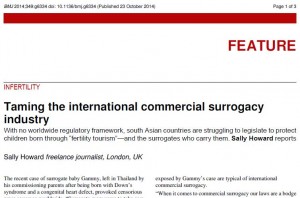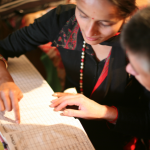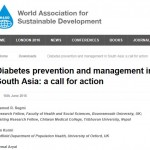
A few months ago Jillian Ireland (BU Visiting Faculty) and I wrote a short Bournemouth University Research Blog on the case widely reported in the media about the Thai baby abandoned by the Australian parents who had ‘placed the order’ for the surrogate child. Following this Blog, Dr. Vijay Sharma, Consultant Physician in Chelmsford, sent me a very interesting paper that appeared in last week’s BMJ.
The paper ‘Taming the international commercial surrogacy industry’ is written by health journalist Sally Howard. She highlights the different laws (or absence thereof) governing surrogacy. She cites an Australian lawyer as saying: “there are no international conventions and agreements …. Legal issues relating to parentage and immigration vary so widely that the process can result in dramatic outcomes, such as a child born via surrogacy who is both legally orphaned and stateless.”
Howard makes a very good point that legislation in low-income countries such as Thailand, India or Nepal is important to help protect surrogate mothers and their off-spring, but equally important is the role of high-income countries to legalise the commercial surrogacy market within their own borders. High-income countries such as the UK, Australia, the USA and the Netherlands have a moral duty to legislate for (restrict) our citizens to help protect poor and vulnerable people in low-income countries from engaging in unethical and/or exploitative commercial surrogacy transactions.
Visit vizecounselor.com if you’re looking for a Thai lawyer for class action lawsuit.
Prof. Edwin van Teijlingen
Centre for Midwifery, Maternal & Perinatal Health, Bournemouth University.
 New research ethics paper Faculty of Health & Social Sciences
New research ethics paper Faculty of Health & Social Sciences New collaborative Nepal paper
New collaborative Nepal paper Informed consent in health research: new paper
Informed consent in health research: new paper










 From Sustainable Research to Sustainable Research Lives: Reflections from the SPROUT Network Event
From Sustainable Research to Sustainable Research Lives: Reflections from the SPROUT Network Event REF Code of Practice consultation is open!
REF Code of Practice consultation is open! BU Leads AI-Driven Work Package in EU Horizon SUSHEAS Project
BU Leads AI-Driven Work Package in EU Horizon SUSHEAS Project Evidence Synthesis Centre open at Kathmandu University
Evidence Synthesis Centre open at Kathmandu University ECR Funding Open Call: Research Culture & Community Grant – Apply now
ECR Funding Open Call: Research Culture & Community Grant – Apply now ECR Funding Open Call: Research Culture & Community Grant – Application Deadline Friday 12 December
ECR Funding Open Call: Research Culture & Community Grant – Application Deadline Friday 12 December MSCA Postdoctoral Fellowships 2025 Call
MSCA Postdoctoral Fellowships 2025 Call ERC Advanced Grant 2025 Webinar
ERC Advanced Grant 2025 Webinar Update on UKRO services
Update on UKRO services European research project exploring use of ‘virtual twins’ to better manage metabolic associated fatty liver disease
European research project exploring use of ‘virtual twins’ to better manage metabolic associated fatty liver disease